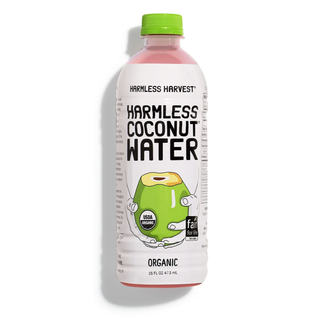
[ad_1]
Coconut water has grown in popularity over the past few years, but this beverage dubbed “nature’s sports drink” has been around for centuries. Packed with electrolytes and flavor, coconut water is the clear liquid found inside young coconuts and has a slew of health benefits. It differs from coconut milk, which has a creamy white hue and incorporates the actual coconut flesh. Here’s everything you need to know about the tropical drink, including nutrition facts and health benefits.
This content is imported from {embed-name}. You may be able to find the same content in another format, or you may be able to find more information, at their web site.
Coconut Water Nutrition Facts
Serving Size: 8oz Vita Coco Coconut Water (note that nutrition facts may vary slightly by brand)
Calories: 45
Total Fat: 0g
Cholesterol: 0mg
Sodium: 25mg
Potassium: 470mg
Total Carbohydrate: 11g
Total Sugars: 11g
Protein: 0g
Calcium: 4% DV
Magnesium: 4% DV
Phosphorus: 2% DV
Coconut Water Health Benefits
- May aid with post-workout recovery: Coconut water is abundant in several electrolytes including potassium, sodium, and magnesium. If you’re having an intense sweat session, especially in the summer months when you may be sweating more, Chicago-based registered dietitian, Maggie Michaelczyk, says that the electrolytes in coconut water can help to regulate fluid balance, prevent dehydration, and even ensure proper muscle function. Of course, you’ll want to make sure you refuel with enough carbohydrates and protein post-workout as well.
- May help reduce blood pressure and stroke risk: Bananas are notorious for their high potassium counts, but just one cup of coconut water contains more potassium than a medium sized banana. Research suggests that potassium-rich diets can help support heart health by reducing blood pressure and even protecting against stroke.
- May support good digestion: Coconut water contains magnesium, a mineral that helps to keep things moving and prevent constipation says Michaelcyzk.
- May help if you’re sick: If you’re under the weather, the body can lose a tremendous amount of fluid from vomiting and diarrhea. Michaelcyzk notes that coconut water can help with hydration status and balance electrolytes better than regular water in this scenario.
- May promote healthy skin: Lack of proper hydration can lead to dry, tight, and even flaky skin. Drinking coconut water can contribute to your daily hydration needs which promotes circulation and radiant skin. Certain varieties of coconut water are fortified with vitamin C which has a slew of antioxidant properties and naturally stimulates collagen synthesis, which can help keep your skin firm and youthful-looking.
- Great alternative to sugary beverages: Skip the sugary juices and sodas and instead reach for coconut water when you’re in the mood for something other than water, says Michaelczyk. Unlike sugar sweetened beverages, coconut water usually has little to no added sugar (in unflavored varieties). This makes it a great choice for diabetics or individuals looking to reduce their consumption of added sugar.
- May help you lose weight: Proper hydration is essential for nourishing every cell in the body and optimizing your metabolic rate. Many people mistake thirst for hunger, prompting them to overeat which can lead to weight gain. And even though coconut water has more calories than plain water, it is substantially lower in calories than other beverages like soda and juice. This simple swap can help you cut back on calories over the course of the week.
- Hangover helper: If a little too much wine at happy hour left you feeling dehydrated and foggy the next day, Michaelczyk offers a pro-tip to keep coconut water stocked in your fridge. She says it will help to replenish those electrolytes that drinking may have depleted and can be a great thirst quencher.
Disadvantages of Coconut Water
You may be wondering whether or not it is good to drink coconut water every day. For the general population, coconut water is generally considered safe to consume and provides a delicious source of natural electrolytes. But, there are a few exceptions to be aware of.
If you have renal failure, you’ll want to be careful with drinking coconut water as it is high in potassium. Although this nutrient is normally healthy for the body, when kidneys fail they can no longer remove excess potassium and monitoring your intake is important. Coconut water may provide an unexpected but major source of potassium if consumed regularly.
Best Coconut Water Brands
We love coconut water added to smoothies or even making it into ice cubes for a refreshing addition to any beverage. When browsing the coconut water aisle at the grocery store, you’ll first want to look for coconut water that is not made from concentrate. Ideally, the beverage should be 100% coconut water. Some brands fortify their coconut water with nutrients like vitamin C to give it an extra antioxidant boost. But you’ll want to avoid any other additives or excessive amounts of added sugar, which is more prevalent in the flavored varieties.
Stick with plain unsweetened and unflavored coconut water from some of our favorite brands:
This content is created and maintained by a third party, and imported onto this page to help users provide their email addresses. You may be able to find more information about this and similar content at piano.io
This commenting section is created and maintained by a third party, and imported onto this page. You may be able to find more information on their web site.
[ad_2]
Source link




